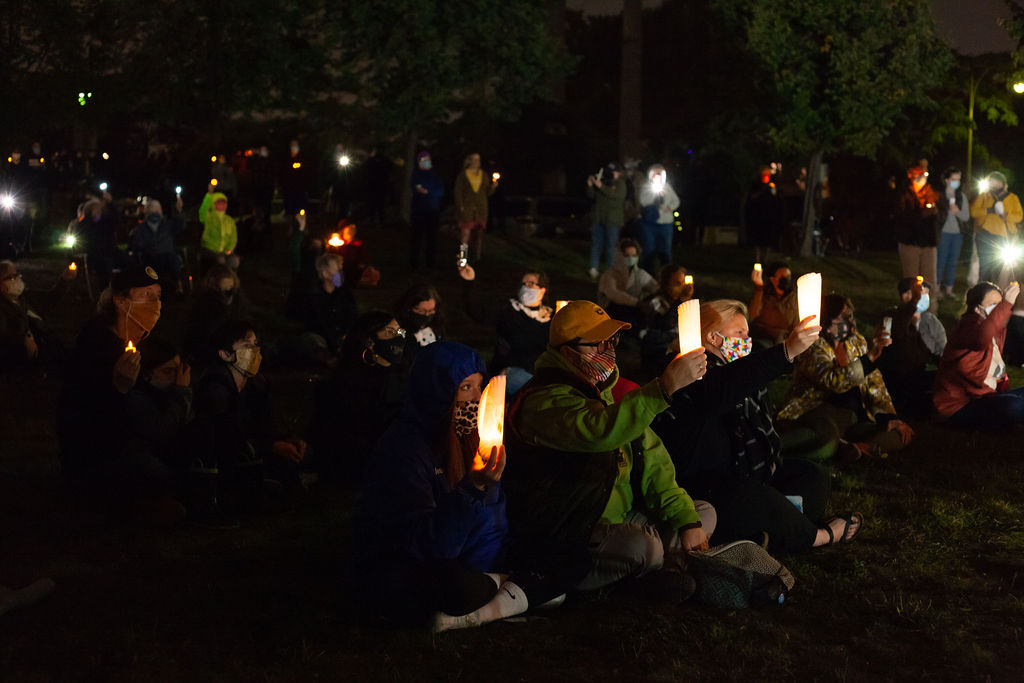RBG’s Legal Legacy
We are not legal problems to be solved, we're human beings.

Like Justice Ginsburg, as Legal Director of Gender Justice, I am passionate about pursuing gender equity through the law.
Justice Ginsburg understood that our laws – our constitution, statutes, and court opinions – are not handed down from on high. These laws are written and interpreted by people in positions of power. They reflect their views, biases, and stereotypes – and often also reflect their commitment to maintaining that power.
Ruth Bader Ginsburg, as a lawyer and a judge, regularly named this. As a lawyer, she challenged laws that presumed women were less suited than men to manage finances. She challenged laws that kept women out of jury pools because it was presumed that all women would be home caring for children, which was supposedly more important than their civic participation. And as a judge, in a majority opinion she wrote in a case regarding the Virginia Military Institute’s ban on women cadets, she mentioned a case out of Hennepin County Minnesota – in 1876 Martha Angle Dorsett was denied admission to the bar as an attorney by the Hennepin County Minnesota court of common pleas. In denying her, the judge said “Look, this is not just “old fogy-ism” – a term he actually used – but women need to spend their time caring for children and can’t possibly have the time to put in all the work that being a good lawyer requires – allowing women to be lawyers would be bad for the profession.
Justice Ginsburg understood that these laws are gatekeeping laws. Rather than reflecting the true potential of women, they act as self-fulfilling prophecies based on restrictive stereotypes. Justice Ginsburg was also a reliable champion for LGBTQ civil rights in the courtroom, reminding others in the courtroom that LGBTQ people are not legal issues, we’re human beings. Justice Ginsburg always seemed to remember the humanity within the cases.She ended her opinion in the Virginia Military Case I mentioned earlier by stating,
“A prime part of the history of our Constitution is the story of the extension of Constitutional rights and protections to people once ignored or excluded. There is no reason to believe that the admission of women capable of all the activities required of VMI cadets would destroy the Institute rather than enhance its capacity to serve the ‘more perfect Union.’”
I mentioned a majority opinion of hers, but of course Justice Ginsberg is best known for her dissents. One of her most famous dissents was in Shelby County v. Holder, a decision in which the majority of the court voted to end the federal oversight provision of the Voting Rights Act. This meant an end to an imperfect but important safeguard against rampant voter suppression targeting Black voters. Justice Ginsberg dissented saying that throwing out this safeguard because there is evidence that it is helpful in reducing racist voter suppression is like throwing away your umbrella in a rainstorm because you are not getting wet.
Justice Ginsburg’s legacy of exposing the power disparities of the law is maybe most famous in her work on reproductive rights – including protections for pregnant employees, safe and affordable birth control, and the right to have an abortion. She always reminded the court of the ways in which government restrictions on reproductive freedom – including abortion and birth control – were rooted in paternalistic views of women meant to restrict their autonomy.
In a recent Supreme Court decision that allowed private for-profit employers to opt out of the Affordable Care Act’s requirements regarding birth control coverage, Justice Ginsburg of course dissented. She reminded the court of the real world impact of their decision, saying, “between 70,500 and 126,400 women of childbearing age will experience the disappearance of the contraceptive coverage formerly available to them.”
In a fiery dissent in Gonzalez v. Carhart, she noted that in allowing states to chip away at the right to an abortion, the Court invoked paternalistic stereotypes about women’s fragile emotional states and their inability to make sound decisions as the basis for depriving women of the right to make an autonomous choice. She went on to note that this way of thinking reflects ancient notions about women’s place in the family and under the Constitution—ideas that have long since been discredited.
At Gender Justice, we believe that the law is an imperfect, insufficient, but necessary tool for achieving gender equity, racial justice, and LGBTQ liberation. And like Justice Ginsburg, we understand that simply passing laws is not enough to ensure that people’s rights are protected. It’s essential to make the connection between the law and the impacts on people’s lives. That’s what guides so much of our work at Gender Justice, where we understand our work as a continuation of Justice Ginsburg’s trailblazing.
It’s why we are suing two Minnesota pharmacies that refused to provide our client with her emergency contraception because of the pharmacists’ religious beliefs, and it’s why we’re also representing Our Justice, the First Unitarian Society and two health care providers in a lawsuit, Doe v. Minnesota, to challenge Minnesota’s harmful, antiquated abortion restrictions. We follow in the footsteps of Justice Ginsburg when we make the case for our clients that failures of the law exist outside of the courtroom – they have serious consequences for us, our families, and our communities.
Even when arguing in the majority opinion, Justice Ginsburg always kept in mind that the Supreme Court is a minority among people in this country.
The decisions of nine people carry enormous weight, and they have the power to interpret laws in ways that affect people’s ability to get a job, start a family, and access the health care they need. When Justice Ginsburg dissented, she may have been the minority in the courtroom, but she was rarely alone – because she so often carried our voices with her.
Jess Braverman, Legal Director
